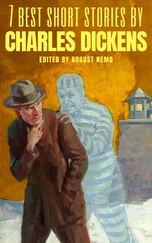Charles Dickens - Pearl-Fishing; Choice Stories from Dickens' Household Words; First Series
Здесь есть возможность читать онлайн «Charles Dickens - Pearl-Fishing; Choice Stories from Dickens' Household Words; First Series» — ознакомительный отрывок электронной книги совершенно бесплатно, а после прочтения отрывка купить полную версию. В некоторых случаях можно слушать аудио, скачать через торрент в формате fb2 и присутствует краткое содержание. ISBN: , Издательство: Иностранный паблик, Жанр: foreign_prose, на английском языке. Описание произведения, (предисловие) а так же отзывы посетителей доступны на портале библиотеки ЛибКат.
- Название:Pearl-Fishing; Choice Stories from Dickens' Household Words; First Series
- Автор:
- Издательство:Иностранный паблик
- Жанр:
- Год:неизвестен
- ISBN:http://www.gutenberg.org/ebooks/49927
- Рейтинг книги:5 / 5. Голосов: 1
-
Избранное:Добавить в избранное
- Отзывы:
-
Ваша оценка:
- 100
- 1
- 2
- 3
- 4
- 5
Pearl-Fishing; Choice Stories from Dickens' Household Words; First Series: краткое содержание, описание и аннотация
Предлагаем к чтению аннотацию, описание, краткое содержание или предисловие (зависит от того, что написал сам автор книги «Pearl-Fishing; Choice Stories from Dickens' Household Words; First Series»). Если вы не нашли необходимую информацию о книге — напишите в комментариях, мы постараемся отыскать её.
Pearl-Fishing; Choice Stories from Dickens' Household Words; First Series — читать онлайн ознакомительный отрывок
Ниже представлен текст книги, разбитый по страницам. Система сохранения места последней прочитанной страницы, позволяет с удобством читать онлайн бесплатно книгу «Pearl-Fishing; Choice Stories from Dickens' Household Words; First Series», без необходимости каждый раз заново искать на чём Вы остановились. Поставьте закладку, и сможете в любой момент перейти на страницу, на которой закончили чтение.
Интервал:
Закладка:
And Giovanna rose, as she said this, to remove herself further from her admirer.
“No, no!” he replied earnestly; “with a pure and holy passion.”
“Impossible!” returned Giovanna. “Are you not married?”
Roszynski vehemently tore a letter from his vest, and handed it to Giovanna. It was sealed with black, for it announced the death of his wife at the baths. It had only arrived that morning.
“You have lost no time,” said the cantatrice, endeavoring to conceal her feelings under an iron mask of reproach.
There was a pause. Each dared not speak. The Count knew – but without actually and practically believing what seemed incredible – that Anielka and Giovanna were the same person — his slave . That terrible relationship checked him. Anielka, too, had played her part to the end of endurance. The long-cherished tenderness – the faithful love of her life, could not longer be wholly mastered. Hitherto they had spoken in Italian. She now said in Polish,
“You have a right, my Lord Roszynski, to that poor Anielka who escaped from the service of your wife in Florence; you can force her back to your palace, to its meanest work, but” —
“Have mercy on me!” cried Leon.
“But,” continued the serf of Pobereze, firmly, “you cannot force me to love you.”
“Do not mock – do not torture me more; you are sufficiently revenged. I will not offend you by importunity. You must indeed hate me! But remember that we Poles wished to give freedom to our serfs; and for that very reason our country was invaded and dismembered by despotic powers. We must therefore continue to suffer slavery as it exists in Russia; but, soul and body, we are averse to it; and when our country once more becomes free, be assured no shadow of slavery will remain in the land. Curse then our enemies, and pity us that we stand in such a desperate position between Russian bayonets and Siberia, and the hatred of our serfs.”
So saying, and without waiting for a reply, Leon rushed from the room. The door was closed. Giovanna listened to the sounds of his rapid footsteps till they died in the street. She would have followed, but dared not. She ran to the window. Roszynski’s carriage was rolling rapidly away, and she exclaimed vainly, “I love you, Leon; I loved you always!”
Her tortures were unendurable. To relieve them she hastened to her desk, and wrote these words: —
“Dearest Leon, forgive me; let the past be forever forgotten. Return to your Anielka. She always has been, ever will be yours.”
She despatched the missive. Was it too late? or would it bring him back? In the latter hope she retired to her chamber, to execute a little project.
Leon was in despair. He saw he had been premature in so soon declaring his passion after the news of his wife’s death, and vowed he would not see Anielka again for several months. To calm his agitation, he had ridden some miles into the country. When he returned to his hotel after some hours, he found her note. With the wild delight it had darted into his soul, he flew back to her.
On regaining her saloon a new and terrible vicissitude seemed to sport with his passion: – she was nowhere to be seen. Had the Italian cantatrice fled? Again he was in despair; stupefied with disappointment. As he stood uncertain how to act in the midst of the floor, he heard, as from a distance, an Ave Maria poured forth in tones he half-recognized. The sounds brought back to him a host of recollections; a weeping serf, the garden of his own palace. In a state of new rapture he followed the voice. He traced it to an inner chamber, and he there beheld the lovely singer kneeling in the costume of a Polish serf. She rose, greeted Leon with a touching smile, and stepped forward with serious bashfulness. Leon extended his arms; she sank into them; and in that fond embrace all past wrongs and sorrows were forgotten! Anielka drew from her bosom a little purse, and took from it a piece of silver. It was the rouble. Now , Leon did not smile at it. He comprehended the sacredness of this little gift; and some tears of repentance fell upon Anielka’s hand.
A few months after, Leon wrote to the steward of Olgogrod to prepare everything splendidly for the reception of his second wife. He concluded his letter with these words: – “I understand that in the dungeon beneath my palace there are some unfortunate men, who were imprisoned during my father’s lifetime. Let them be instantly liberated. This is my first act of gratitude to God, who has so infinitely blessed me!”
Anielka longed ardently to behold her native land. They left Vienna immediately after the wedding, although it was in the middle of January.
It was already quite dark when the carriage, with its four horses, stopped in front of the portico of the palace of Olgogrod. Whilst the footman was opening the door on one side, a beggar soliciting alms appeared at the other, where Anielka was seated. Happy to perform a good action, as she crossed the threshold of her new home, she gave him some money; but the man, instead of thanking her, returned her bounty with a savage laugh, at the same time scowling at her in the fiercest manner from beneath his thick and shaggy brows. The strangeness of this circumstance sensibly affected Anielka, and clouded her happiness. Leon soothed and re-assured her. In the arms of her beloved husband, she forgot all but the happiness of being the idol of his affections.
Fatigue and excitement made the night most welcome. All was dark and silent around the palace, and some hours of the night had passed, when suddenly flames burst forth from several parts of the building at once. The palace was enveloped in fire; it raged furiously. The flames mounted higher and higher; the windows cracked with a fearful sound, and the smoke penetrated into the most remote apartments.
A single figure of a man was seen stealing over the snow, which lay like a winding-sheet on the solitary waste; his cautious steps were heard on the frozen snow as it crisped beneath his tread. It was the beggar who had accosted Anielka. On a rising ground, he turned to gaze on the terrible scene. “No more unfortunate wretches will now be doomed to pass their lives in your dungeons,” he exclaimed. “What was my crime? Reminding my master of the lowness of his birth. For this they tore me from my only child – my darling little Anielka; they had no pity even for her orphan state; let them perish all!”
Suddenly a young and beautiful creature rushes wildly to one of the principal windows: she makes a violent effort to escape. For a moment her lovely form, clothed in white, shines in terrible relief against the background of blazing curtains and walls of fire, and as instantly sinks back into the blazing element. Behind her is another figure, vainly endeavoring to aid her, – he perishes also; neither are ever seen again!
This appalling tragedy horrified even the perpetrator of the crime. He rushed from the place; and as he heard the crash of the falling walls, he closed his ears with his hands, and darted on faster and faster.
The next day some peasants discovered the body of a man frozen to death, lying on a heap of snow, – it was that of the wretched incendiary. Providence, mindful of his long, of his cruel imprisonment and sufferings, spared him the anguish of knowing that the mistress of the palace he had destroyed, and who perished in the flames, was his own beloved daughter – the Serf of Pobereze!
III.
My Wonderful Adventures in Skitzland
I AM fond of Gardening. I like to dig. If among the operations of the garden any need for such a work can be at any time discovered or invented, I like to dig a hole.
On the 3d of March, 1849, I began a hole behind the kitchen wall, whereinto it was originally intended to transplant a plum tree. The exercise was so much to my taste, that a strange humor impelled me to dig on. A fascination held me to the task. I neglected my business. I disappeared from the earth’s surface. A boy who worked a basket by means of a rope and pulley, aided me; so aided, I confined my whole attention to spade labor. The centripetal force seemed to have made me its especial victim. I dug on until Autumn. In the beginning of November I observed that, upon percussion, the sound given by the floor of my pit was resonant. I did not intermit my labor, urged as I was by a mysterious instinct downwards. On applying my ear, I occasionally heard a subdued sort of rattle, which caused me to form a theory that the centre of the earth might be composed of mucus. In November, the ground broke beneath me into a hollow, and I fell a considerable distance. I alighted on the box-seat of a four-horse coach, which happened to be running at that time immediately underneath. The coachman took no notice whatever of my sudden arrival by his side. He was so completely muffled up, that I could observe only the skilful way in which he manipulated reins and whip. The horses were yellow. I had seen no more than this, when the guard’s horn blew, and presently we pulled up at an inn. A waiter came out, and appeared to collect four bags from the passengers inside the coach. He then came round to me.
Читать дальшеИнтервал:
Закладка:
Похожие книги на «Pearl-Fishing; Choice Stories from Dickens' Household Words; First Series»
Представляем Вашему вниманию похожие книги на «Pearl-Fishing; Choice Stories from Dickens' Household Words; First Series» списком для выбора. Мы отобрали схожую по названию и смыслу литературу в надежде предоставить читателям больше вариантов отыскать новые, интересные, ещё непрочитанные произведения.
Обсуждение, отзывы о книге «Pearl-Fishing; Choice Stories from Dickens' Household Words; First Series» и просто собственные мнения читателей. Оставьте ваши комментарии, напишите, что Вы думаете о произведении, его смысле или главных героях. Укажите что конкретно понравилось, а что нет, и почему Вы так считаете.












